Arts & Entertainment
‘Orange is the New Black’ back with riveting final season
Hit Netflix show changed TV forever in multiple ways


Sometimes the hype is true. When the first 13 episodes of “Orange Is the New Black” dropped on July 11, 2013, it changed the way Americans watched television and the role of women in the broadcast industry, both onscreen and behind the cameras.
Now that the seventh and final season has dropped, it’s time to look back on the tremendous impact the series has had and take a spoiler-free look at the “Beginning of the End” as episode one of the last season is titled.
When the series launched, Netflix was a fledgling streaming service best known for shipping DVDs to your home in red envelopes. With the critical and popular success of “Orange,” Netflix became a major Hollywood player producing television series and eventually movies that earned nominations and trophies from such prestigious organizations as GLAAD, GALECA, the Golden Globes, the Emmys and more.
The show also helped to popularize the concept of “binge watching.” Fans spent entire weekends watching every episode of the first season and the way we watched television began to change.
“Orange” also broke new ground with its realistic portrayal of life in a women’s prison and its treatment of serious social issues. Over the course of the first six seasons, the show explored mass incarceration and the rise of the private prison industry; the tension between punishment and rehabilitation; staff corruption and guard brutality; prison overcrowding and funding cuts; substance abuse; violence against women; the terrible impact of solitary confinement; white privilege, white supremacy, institutionalized racism and the Black Lives Matter movement; and the #MeToo Movement.
In season seven, series creator Jenji Kohan takes on a new issue: the inhumane brutality of ICE detention centers. The detention center is run by the same corporation that runs the prison, but conditions there are even worse. The detainees have even fewer rights than the prisoners and limited contact with friends and family. As one detainee realizes, “nobody knows where we are.”
“Orange” also made great strides in the employment and representation of women in television. The casting of trans actress Laverne Cox as inmate Sophia Burset was a historic move that made Cox into a star and an important trans spokesperson. The casting of comedian Lea DeLaria as Carrie “Big Boo” Black was a milestone in the representation of butch lesbians, especially when she brandished a dildo on screen.
Overall, the cast included a rich spectrum of women of different races and ethnicities, sexual orientations and gender identities, ages, socio-economic classes and cognitive abilities. The show also explored a wide variety of life-affirming sexual and platonic relationships between women and celebrated the power of female resilience.
In addition, Kohan also emphasized hiring women to write and direct many of the episodes (several of the shows in later season were directed by cast members). The writing throughout the series was first-rate. Kohan and company craftily used flashbacks to fill in character backstories (and to move the action outside of the prison walls). They also effectively used a delicious dark sense of gallows humor to help lighten the heavy material. The direction was smooth and assured, gliding effortlessly between the various characters and plotlines.
Long-term fans of the show will have no trouble gliding into season seven, which picks up where season six ended. Piper Chapman (Taylor Schilling) has been released on parole but remains in a long-distance relationship with inmate Alex Vause (Laura Prepon). She’s living with her New Age brother Cal (the very funny Michael Chernus) and is having trouble paying for her monitoring devices while working a dead-end job.
With the help of “Pennsatucky” (Taryn Manning), Suzanne “Crazy Eyes” Warren (the dazzling Uzo Aduba) tries to reconcile with her old friends Cindy “Black Cindy” Hayes (Adrienne C. Moore) and Tasha “Taystee” Jefferson (Danielle Brooks). Gloria Mendoza (Selenis Leyva) and Galina “Red” Reznikov (the magnificent Kate Mulgrew) find themselves working in a different kitchen facility.
There’s also lots of turnover and turmoil with the prison staff and their families.
Finally, fan favorites Diane Guerrero (as Maritza Ramos) and Laura Gómez (as Blanca Flores) return as former inmates who are detained during an ICE raid.
If you didn’t watch the first six seasons (and don’t have time to binge-watch over 80 hours of previous episodes) can you start “Orange Is the New Black” midstream? The answer is a resounding yes. The large cast and overlapping plot lines an be daunting at first but it’s easy to read up on the backstory online.
For fans old and new, the seventh and final season of this ground-breaking series is well worth watching. The show digs deeply into some of the most troubling issues of these turbulent times and asks difficult questions that we all must grapple with.
As Suzanne asks, “Do I deserve to be here?” Or, as Gloria and Red discuss, “How do we get back to who we were before?”
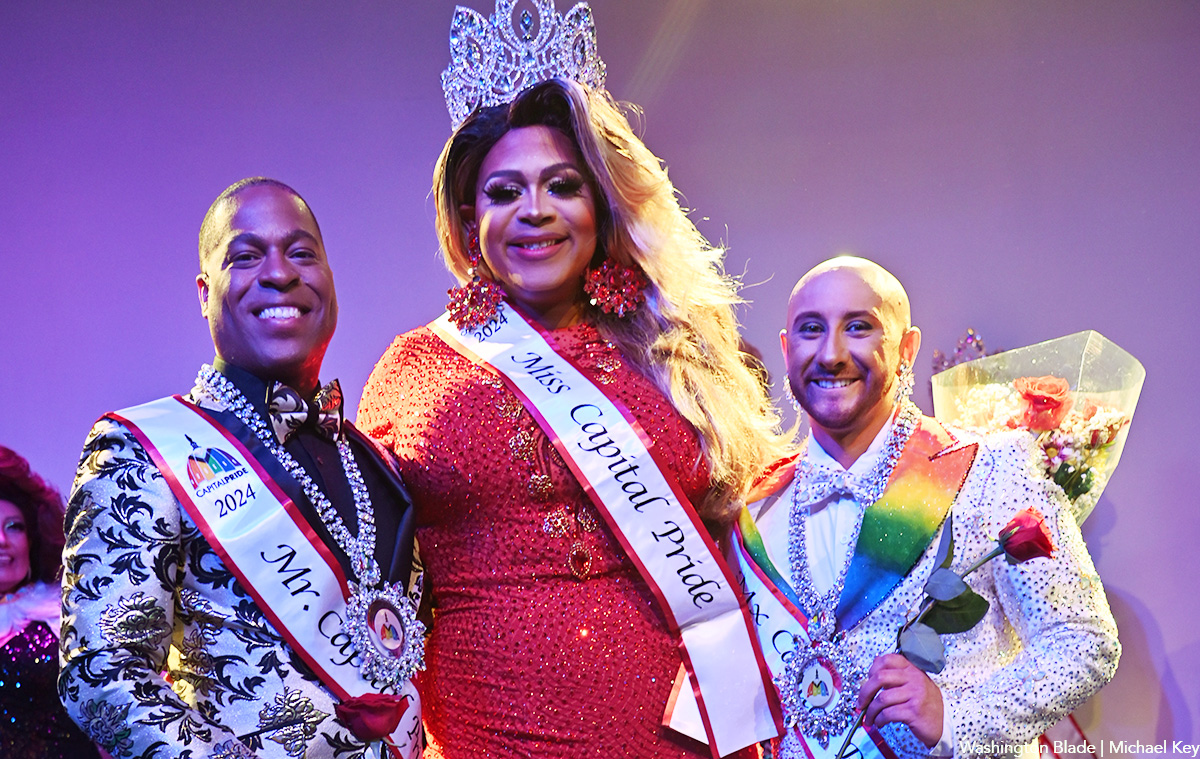
Eight contestants vied for Mr., Miss and Mx. Capital Pride 2024 at a pageant at Penn Social on Saturday. Xander Childs Valentino was crowned Mr. Capital Pride, Dylan B. Dickherson White was crowned Mx. Capital Pride and Sasha Adams Sanchez was crowned Miss Capital Pride.
(Washington Blade photos by Michael Key)
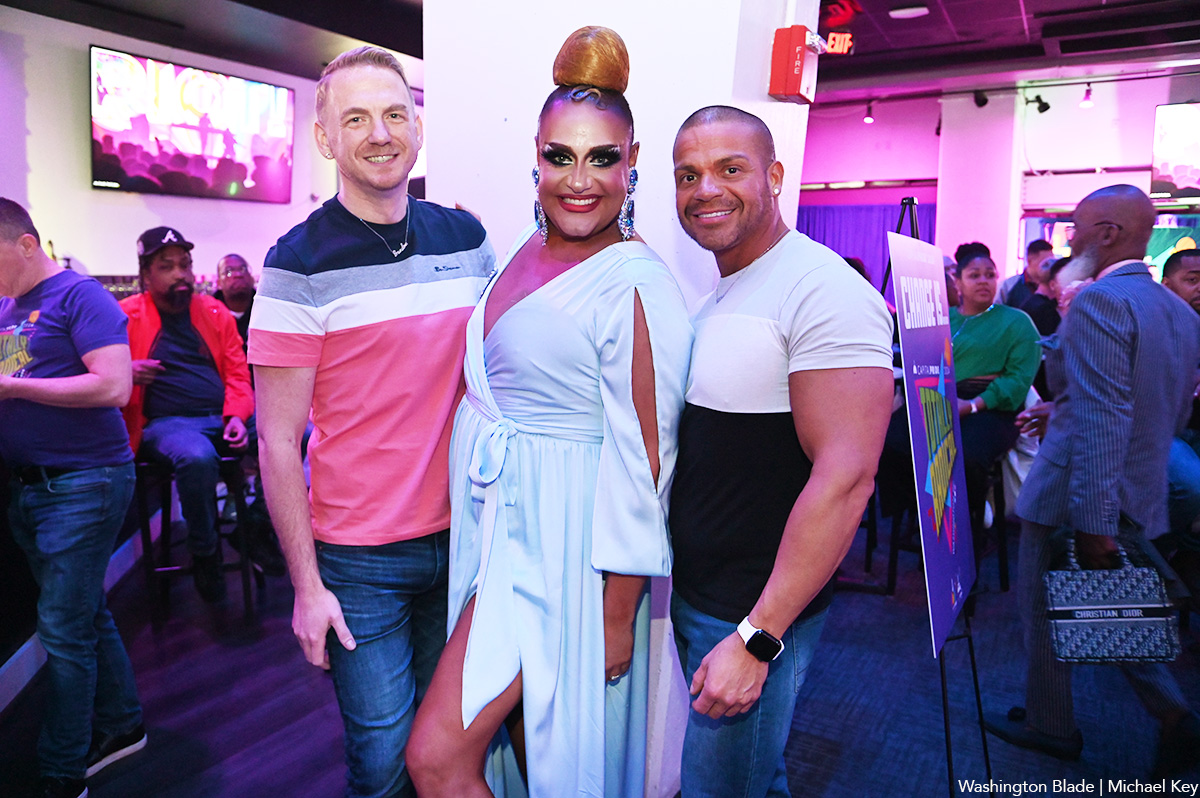
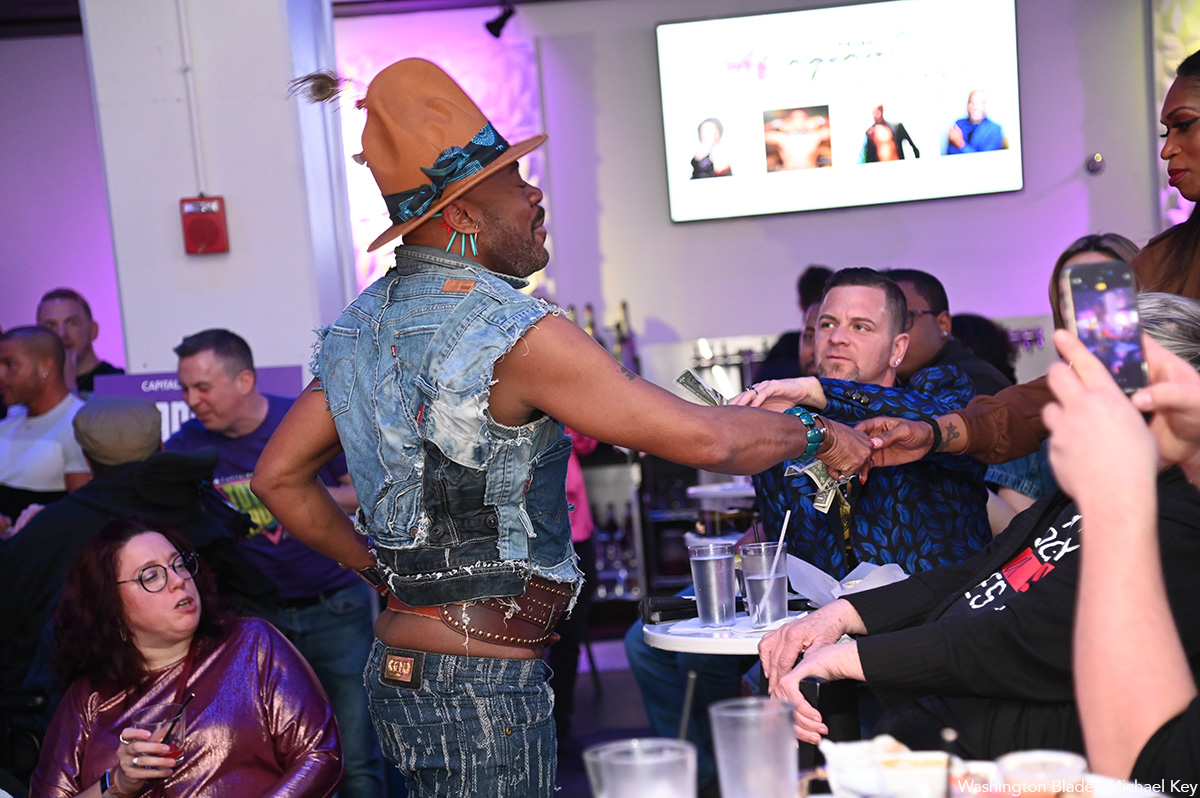
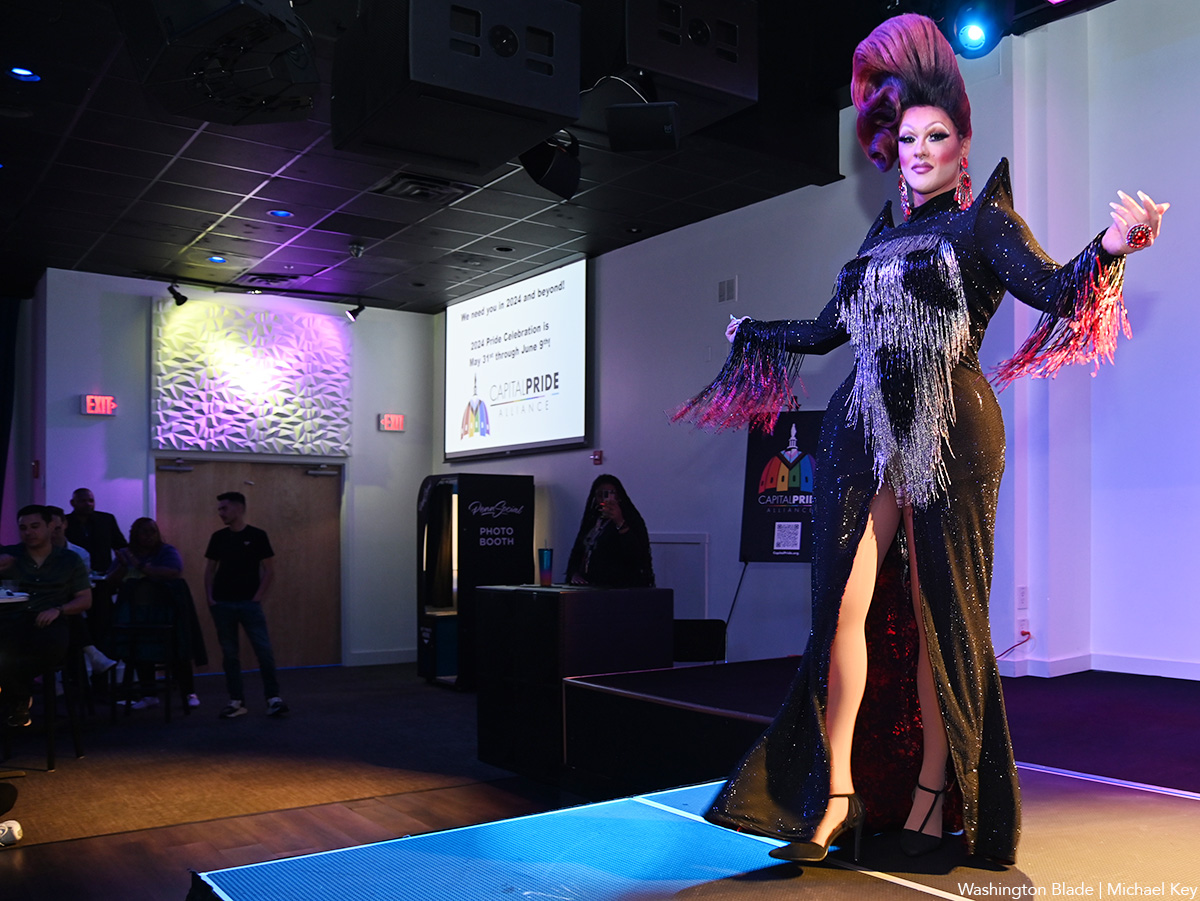
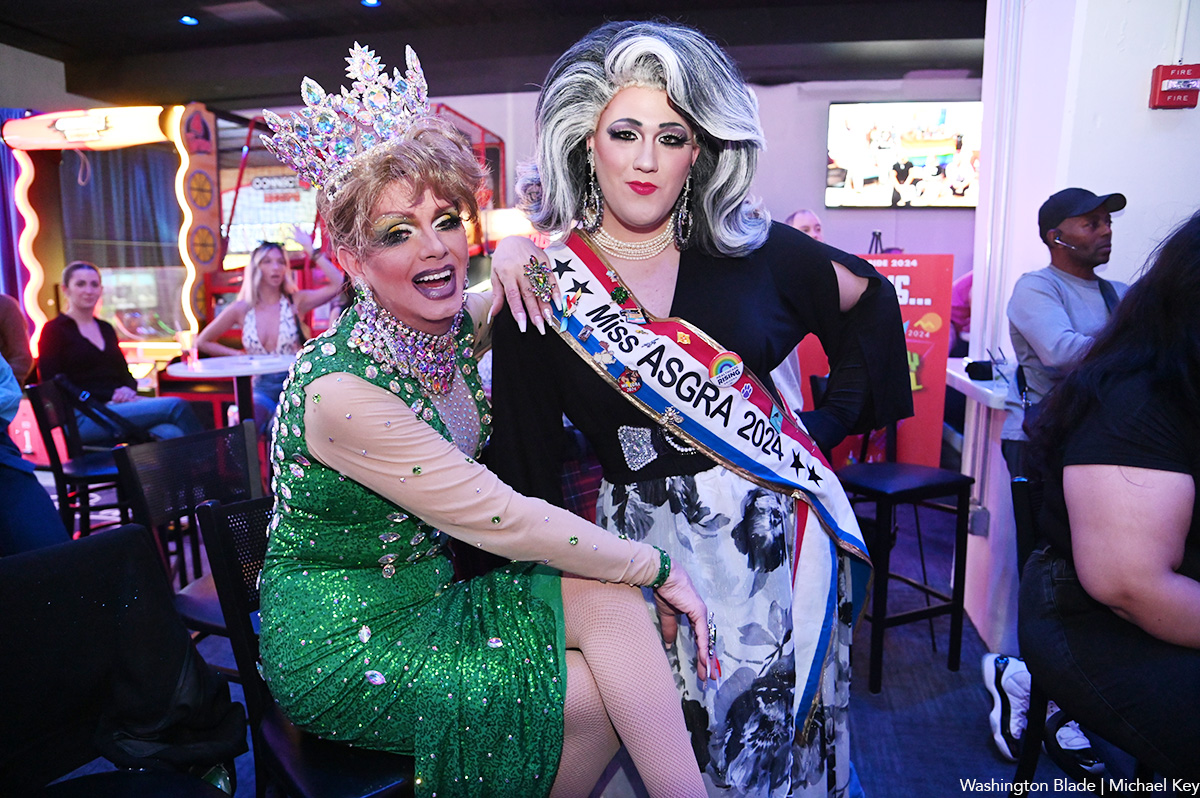
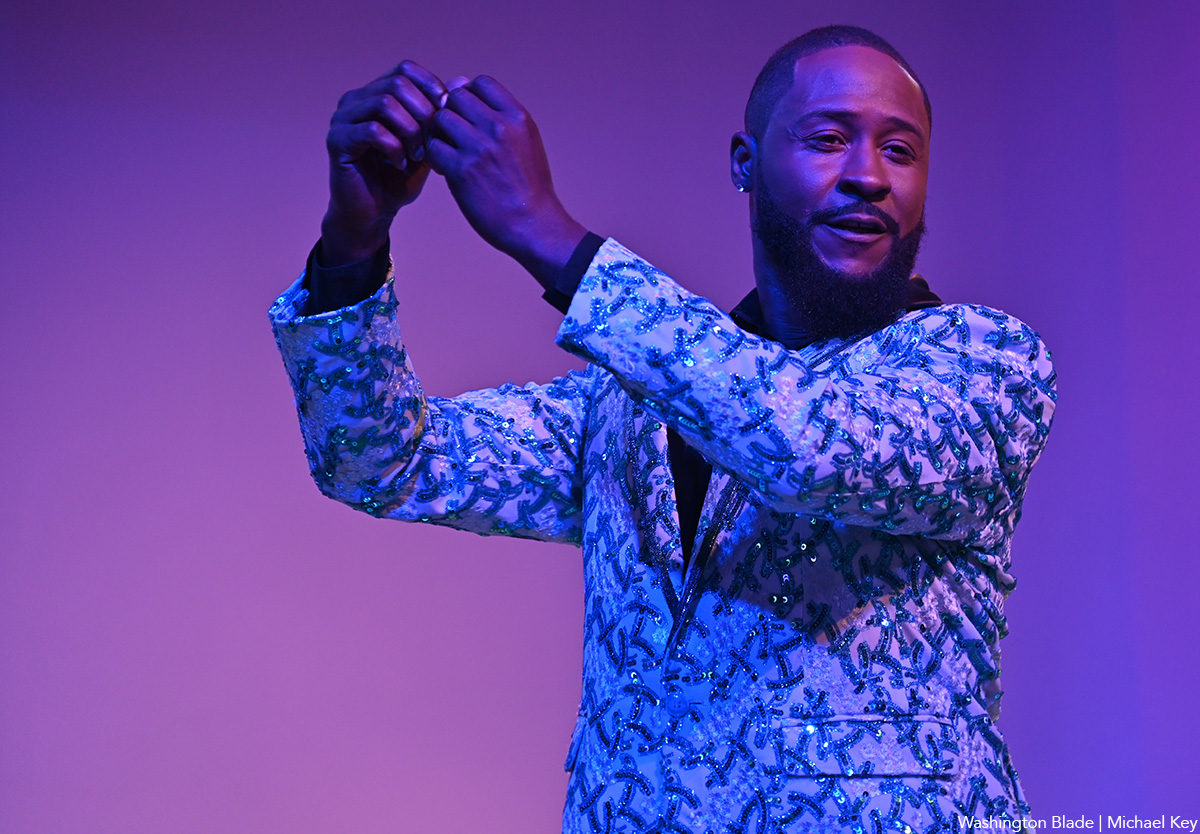
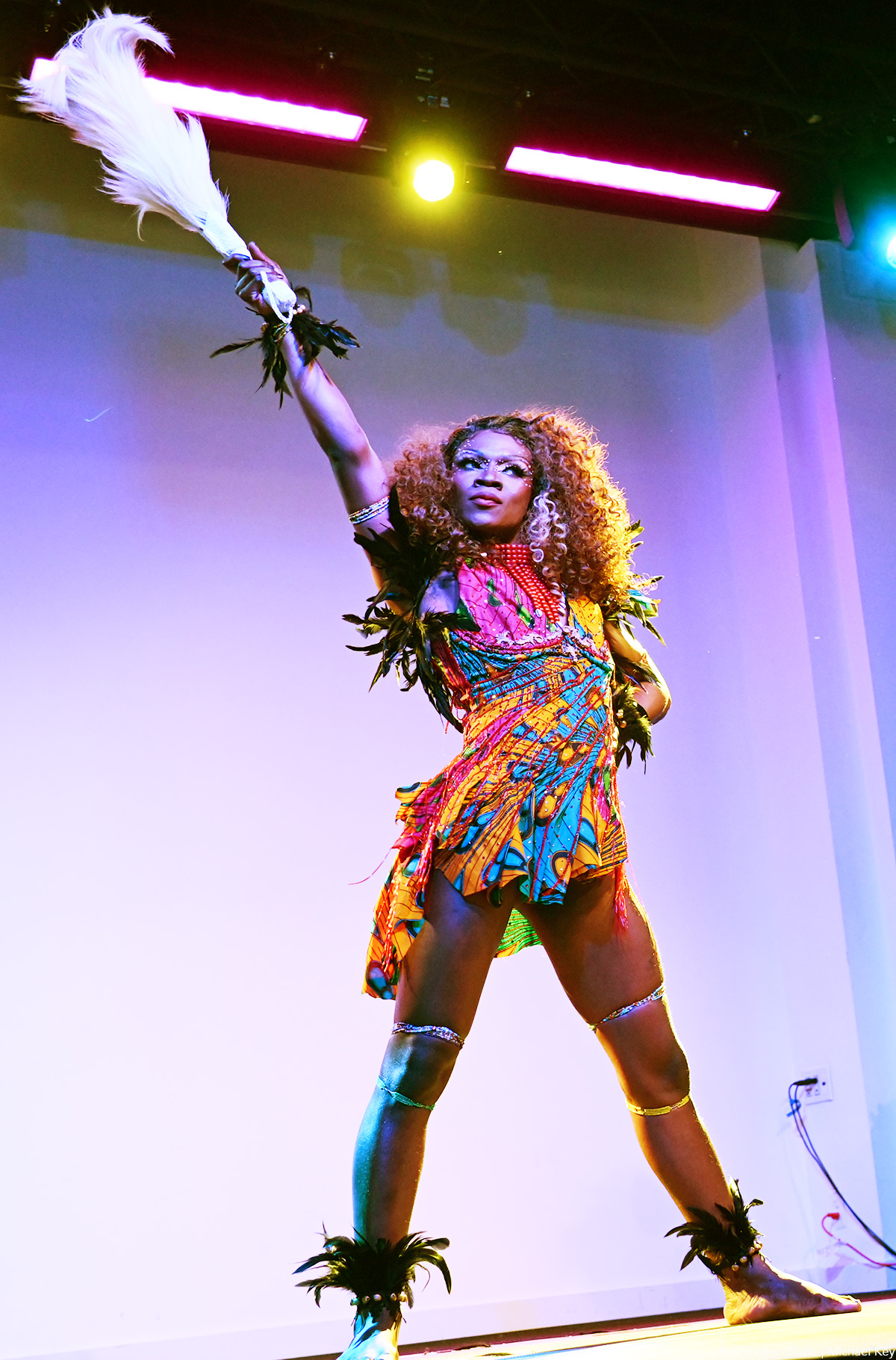
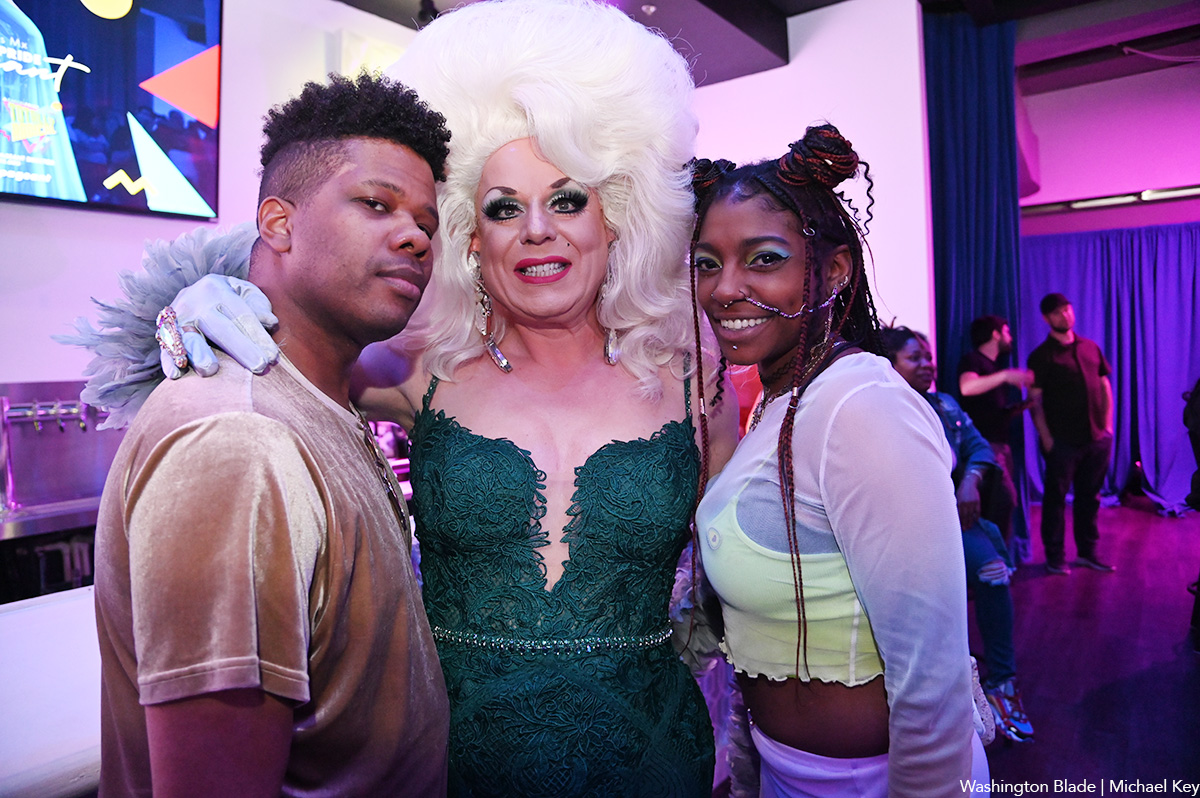
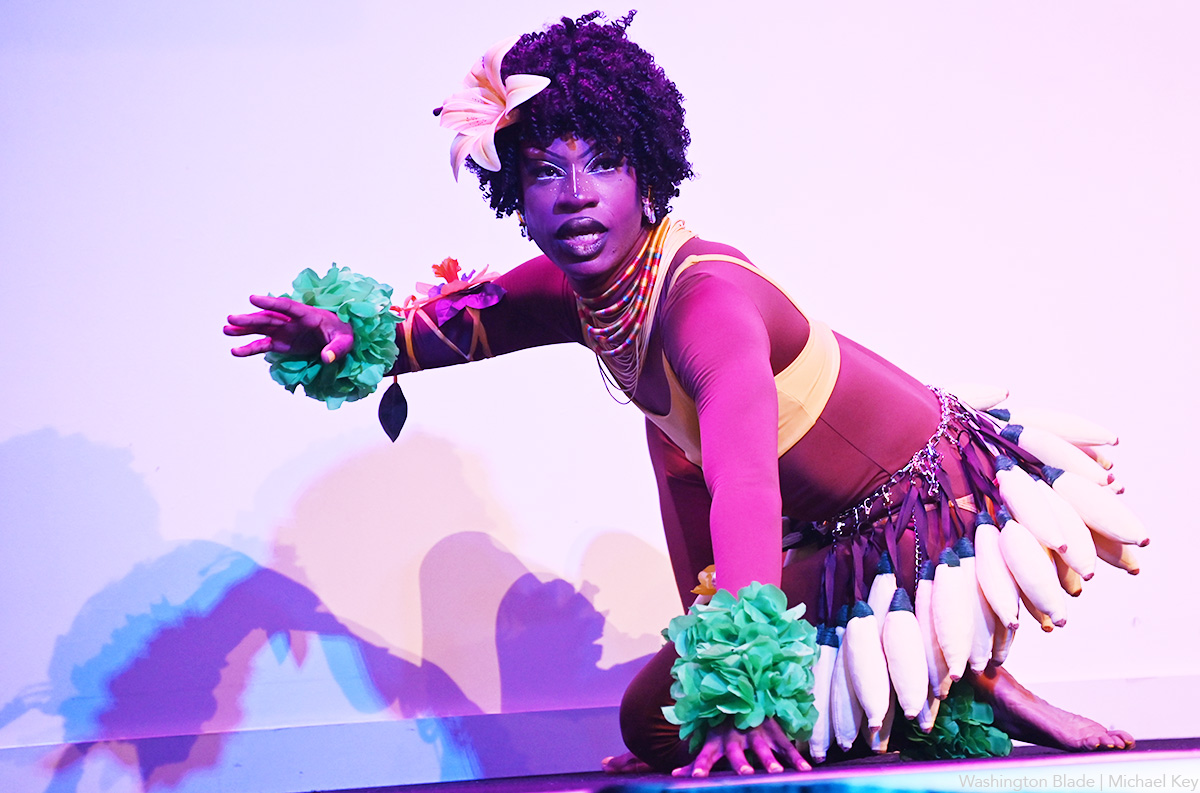
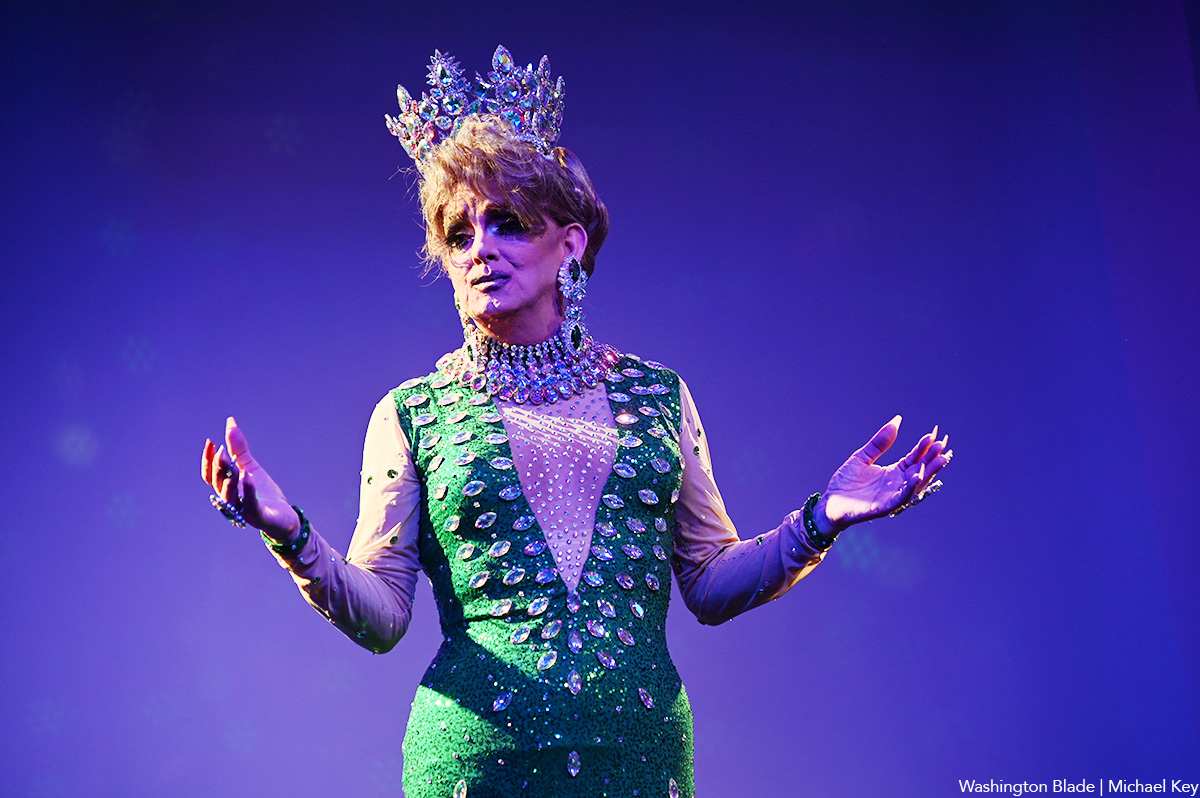
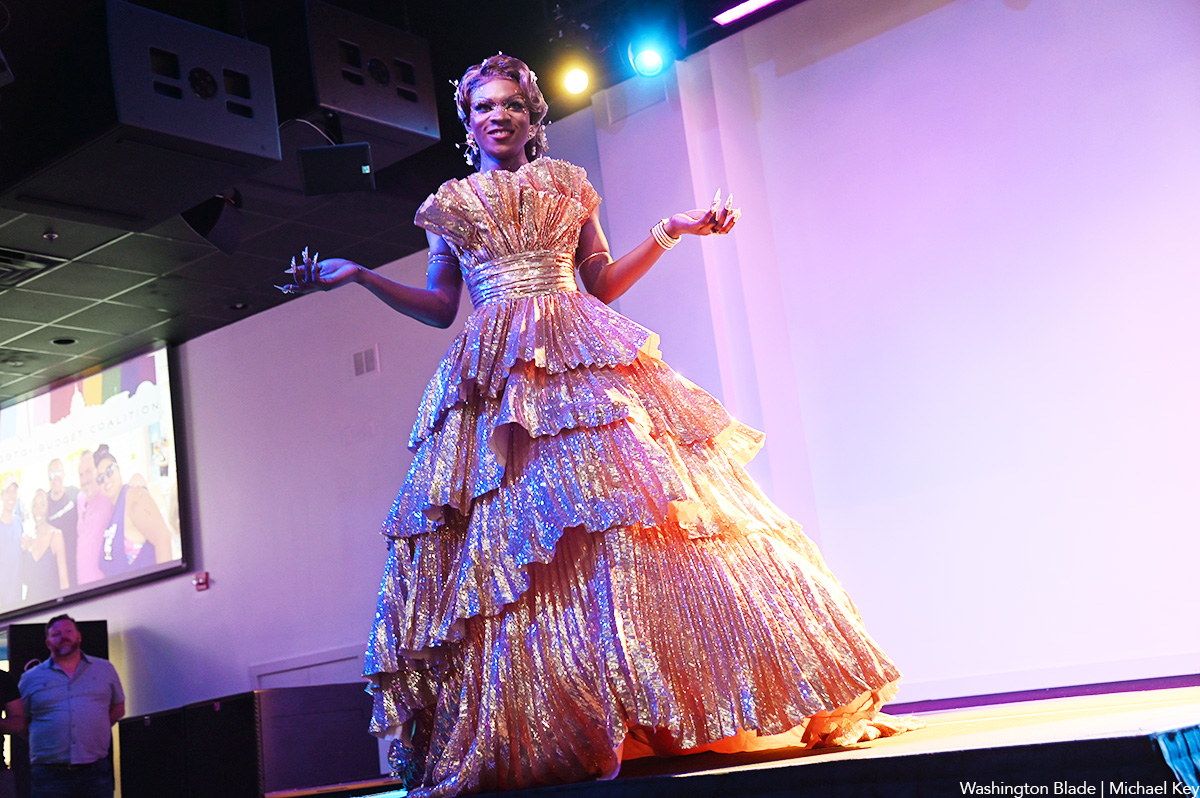
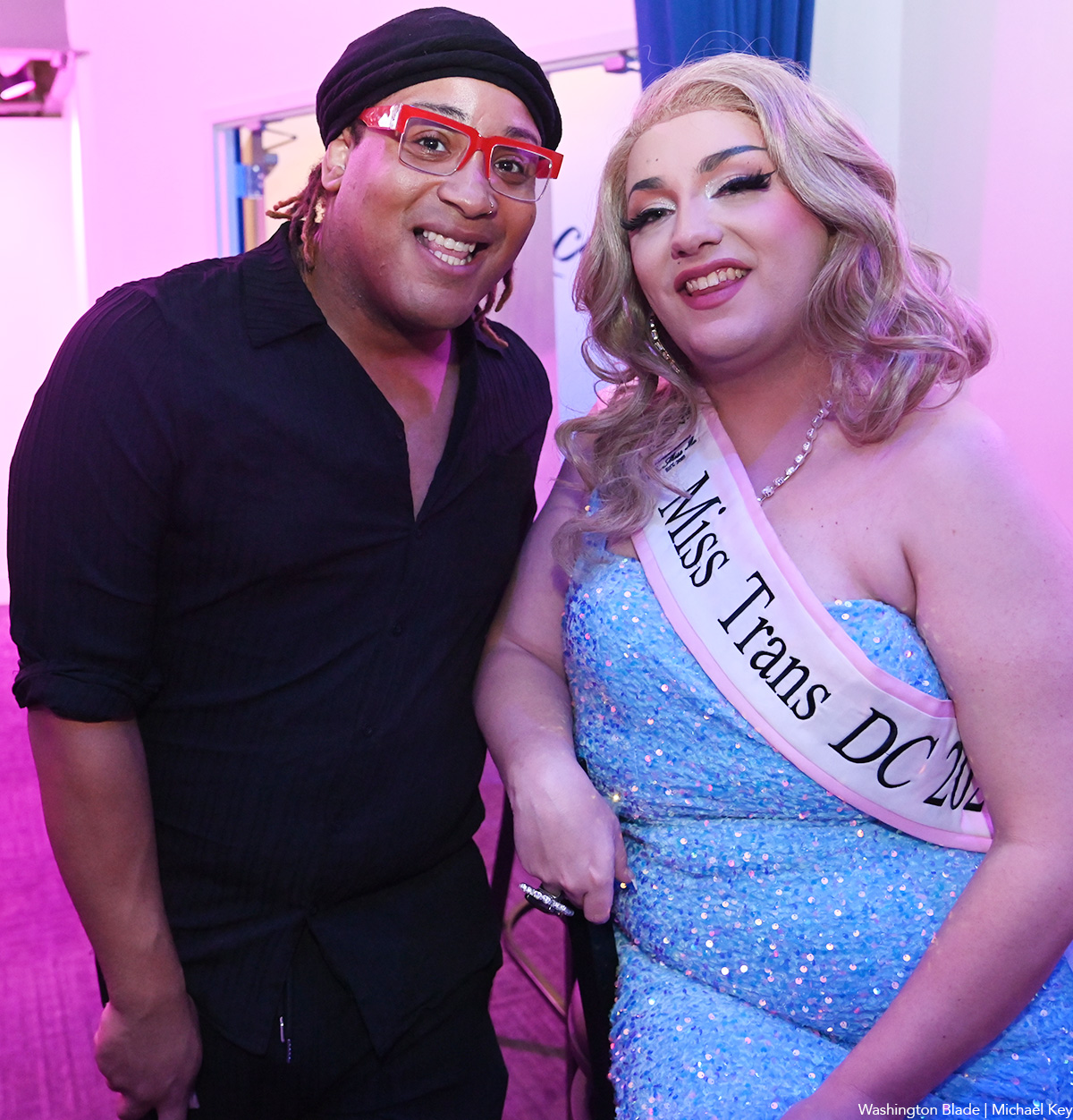
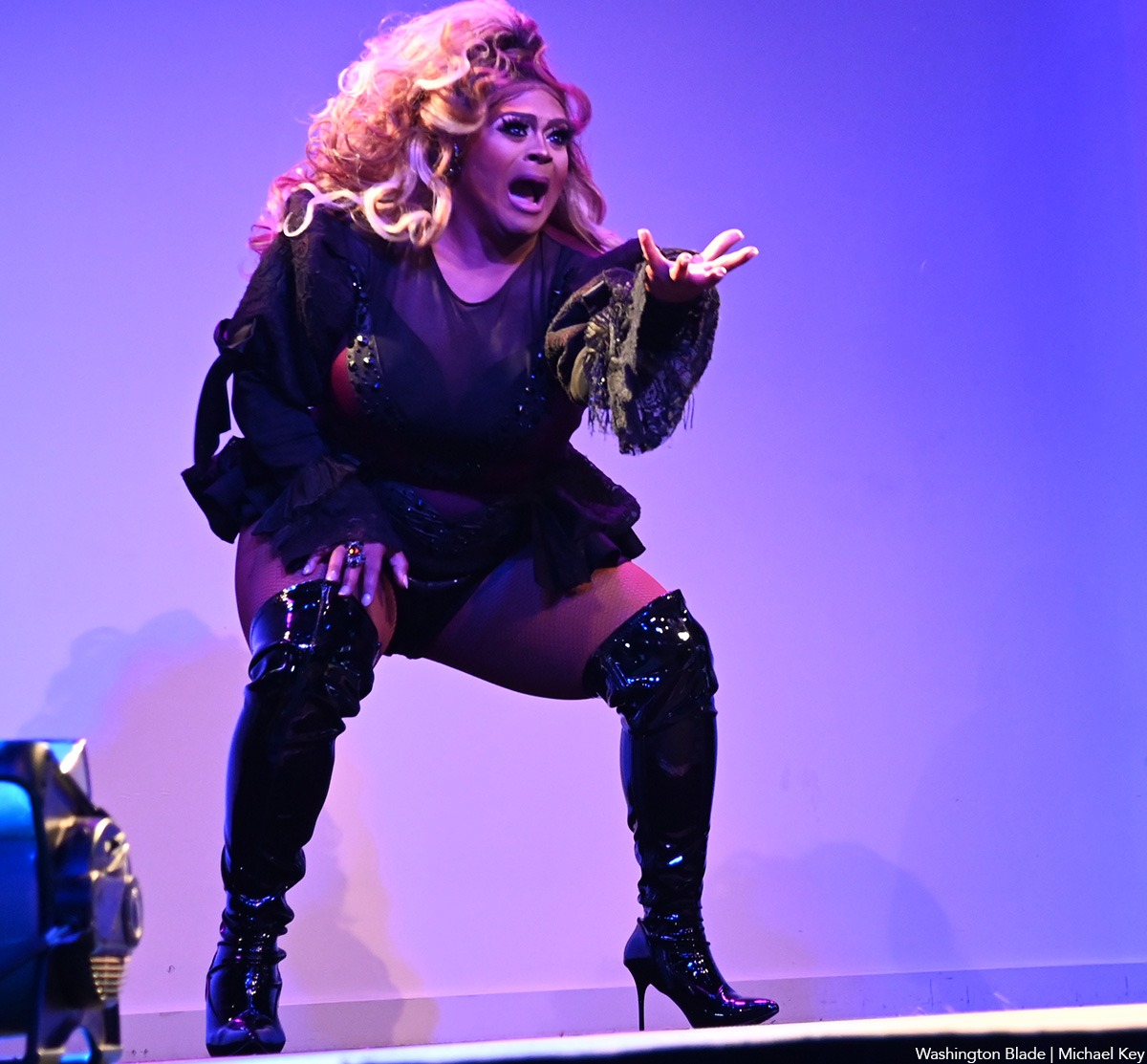
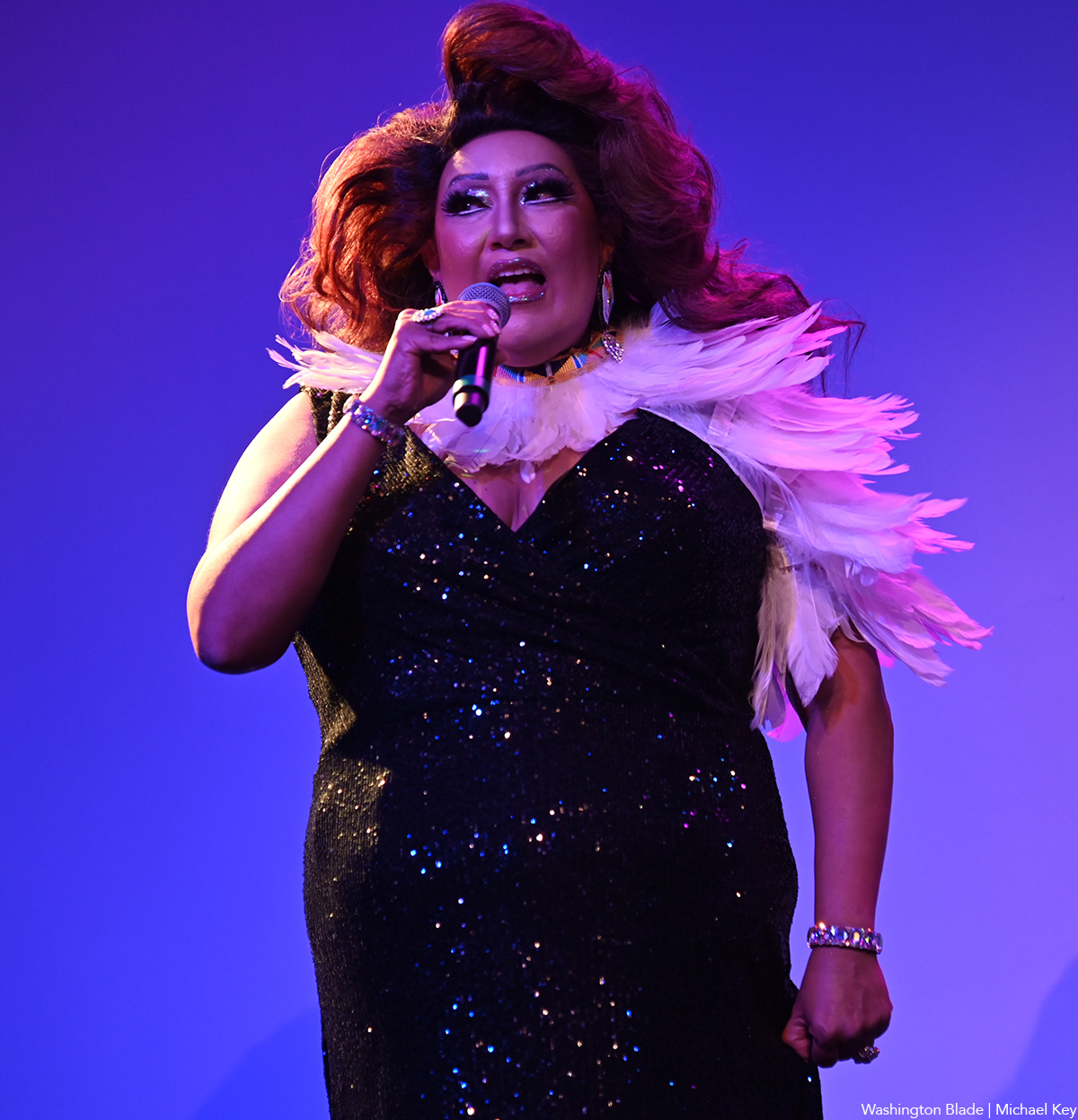
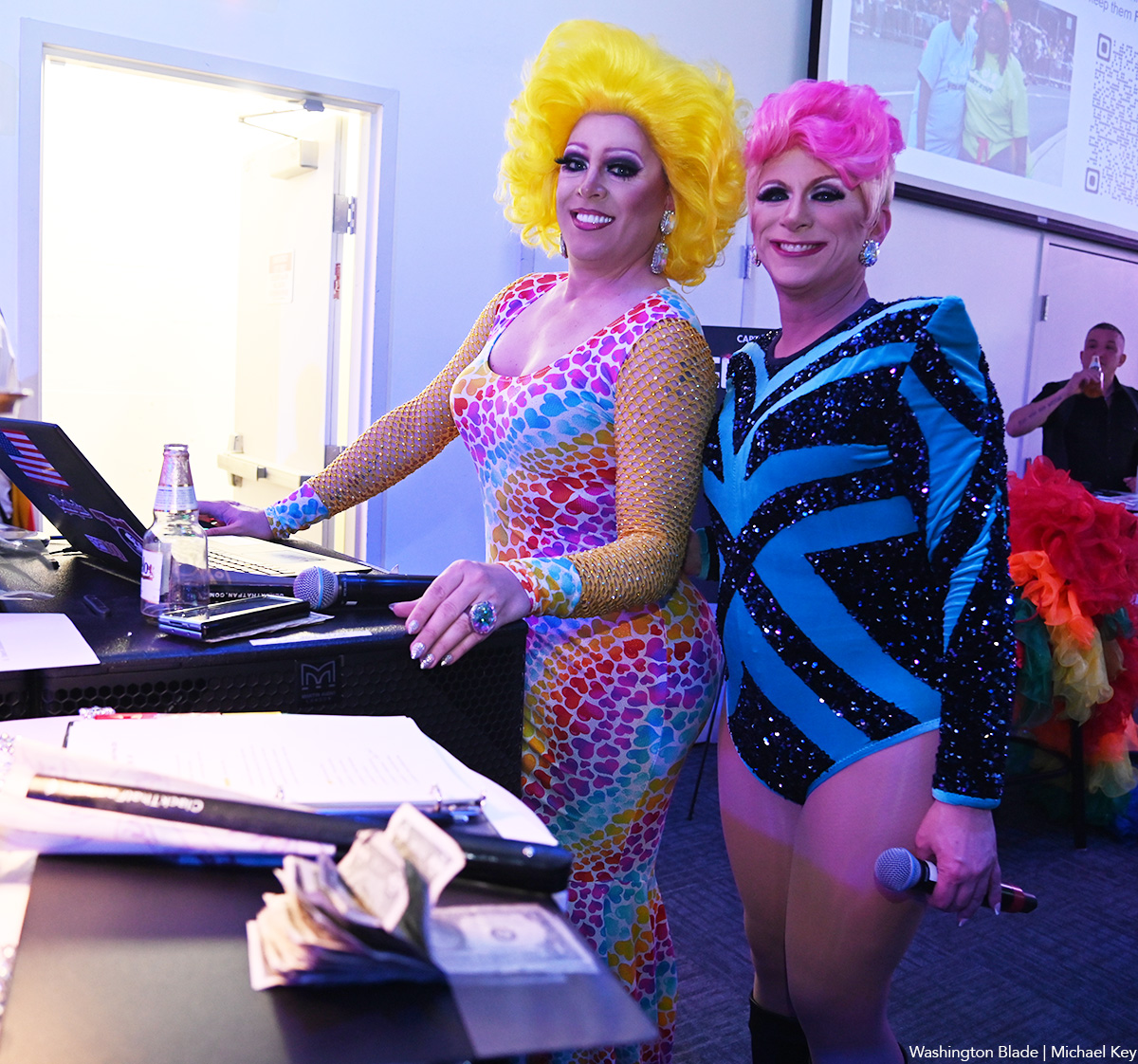
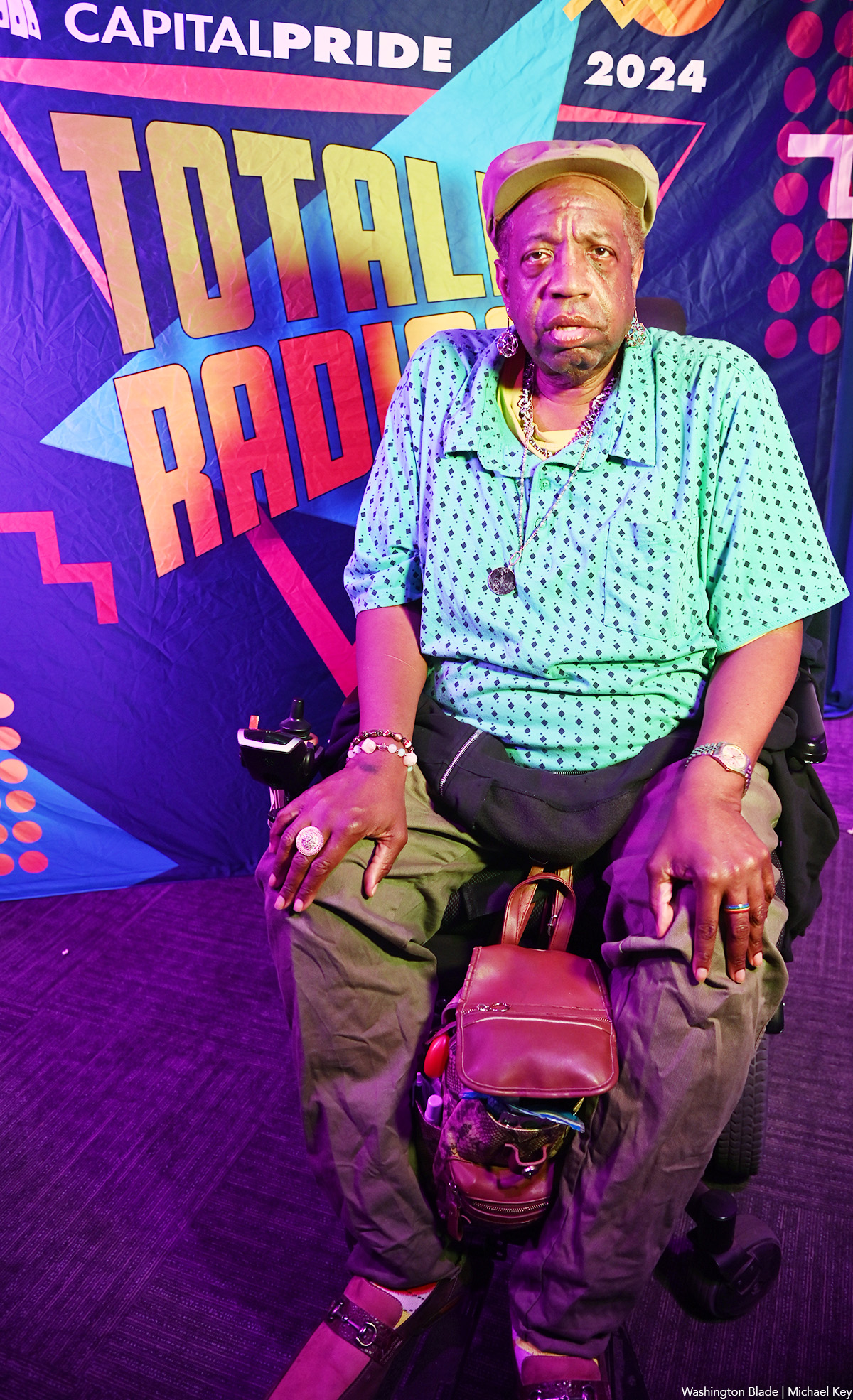
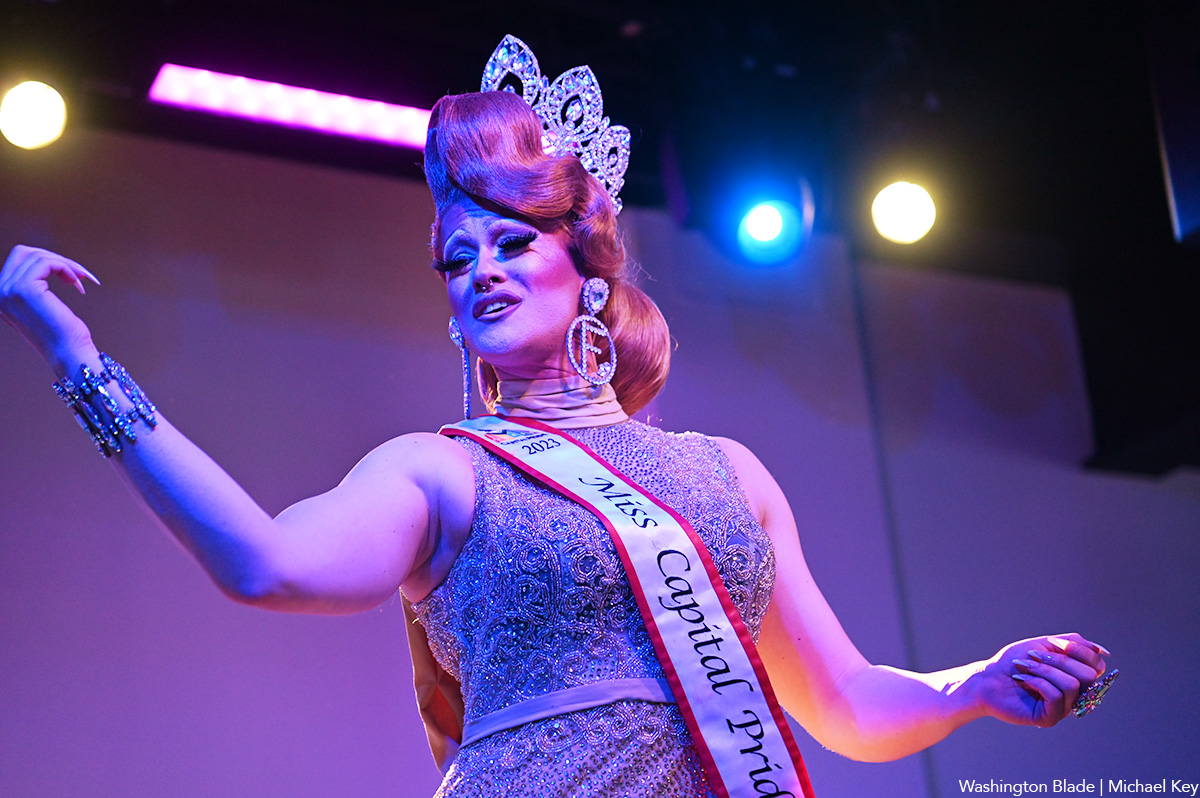
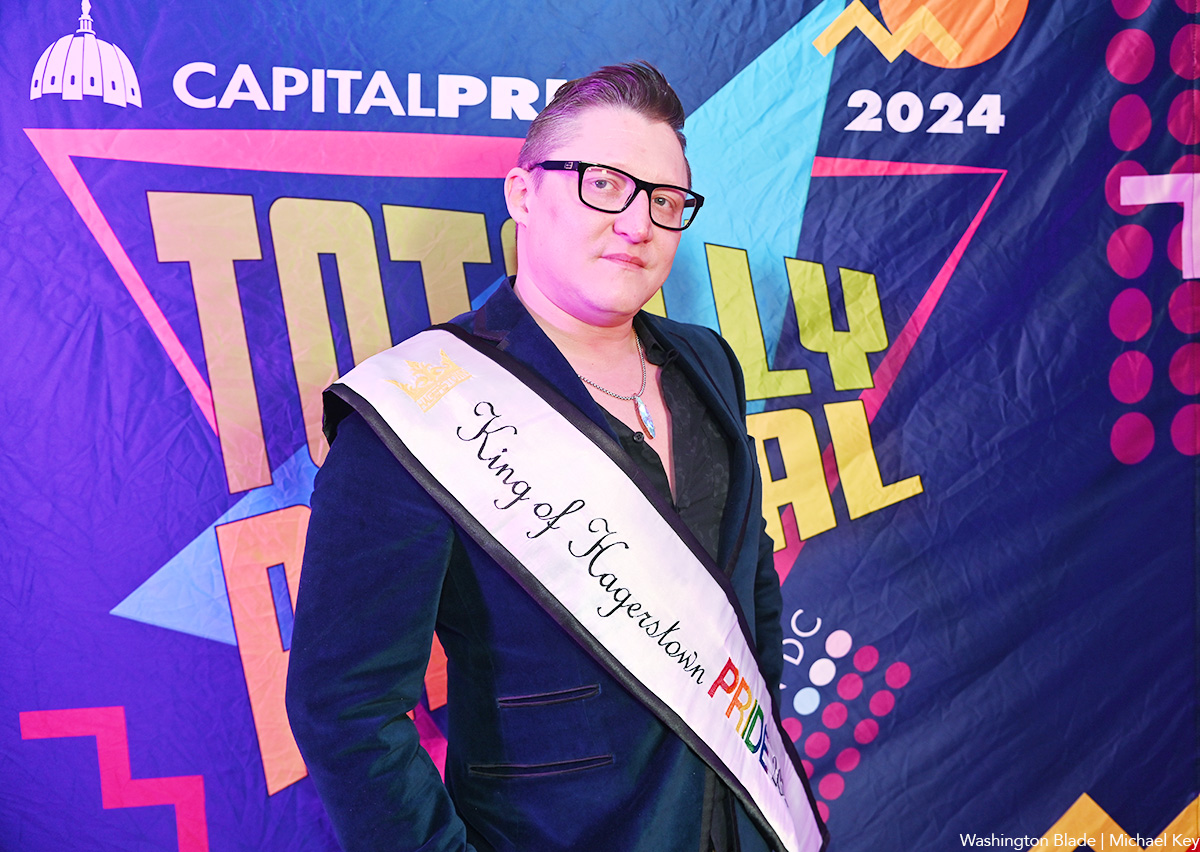
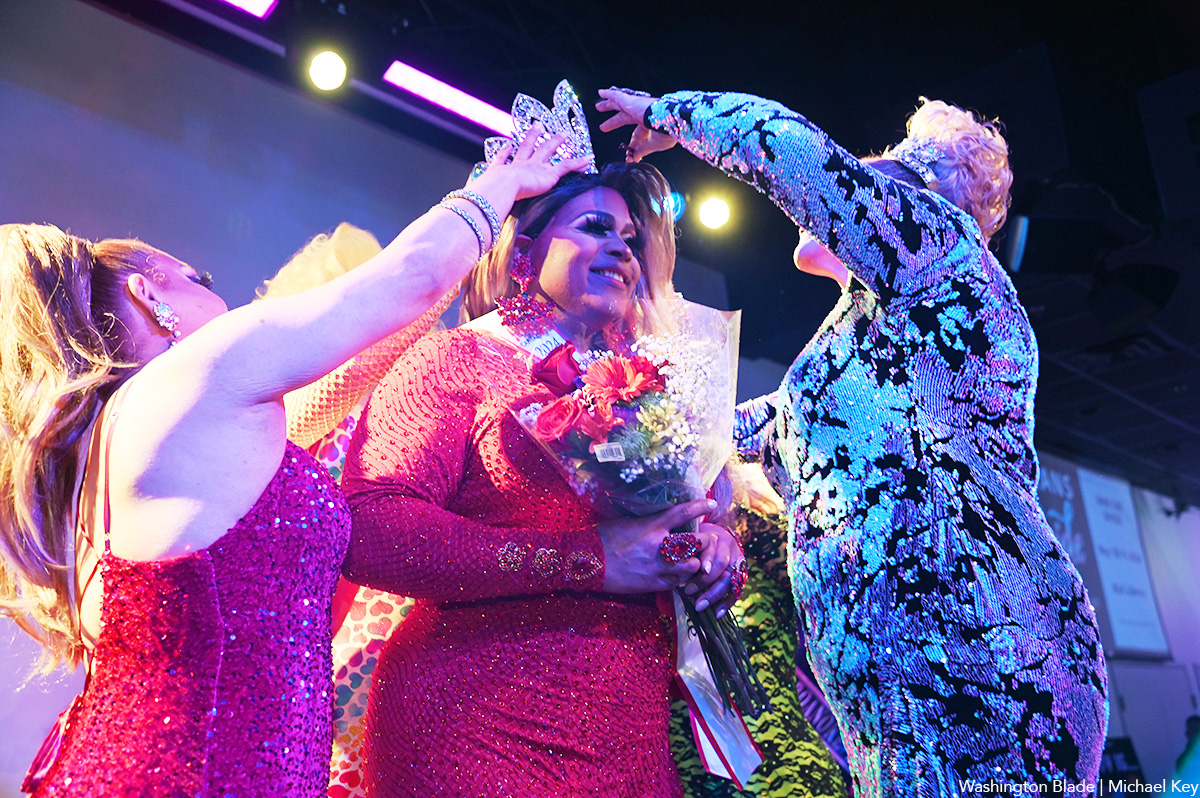
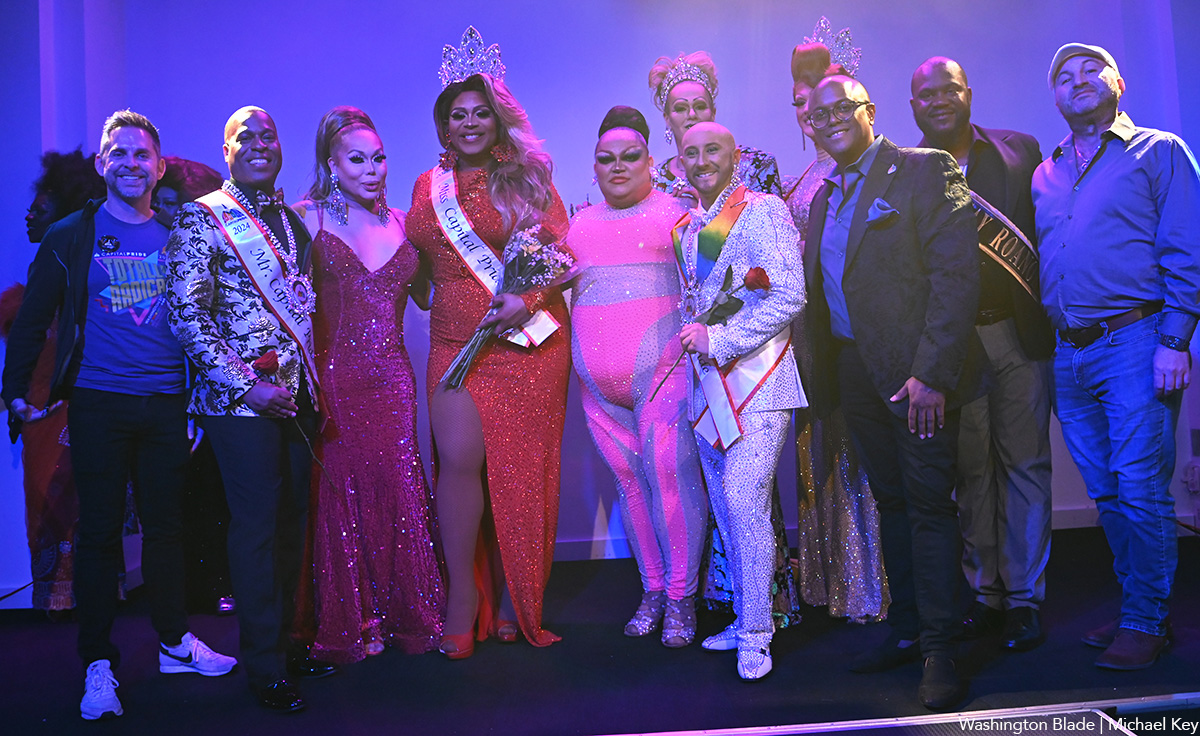
Theater
Round House explores serious issues related to privilege
‘A Jumping-Off Point’ is absorbing, timely, and funny
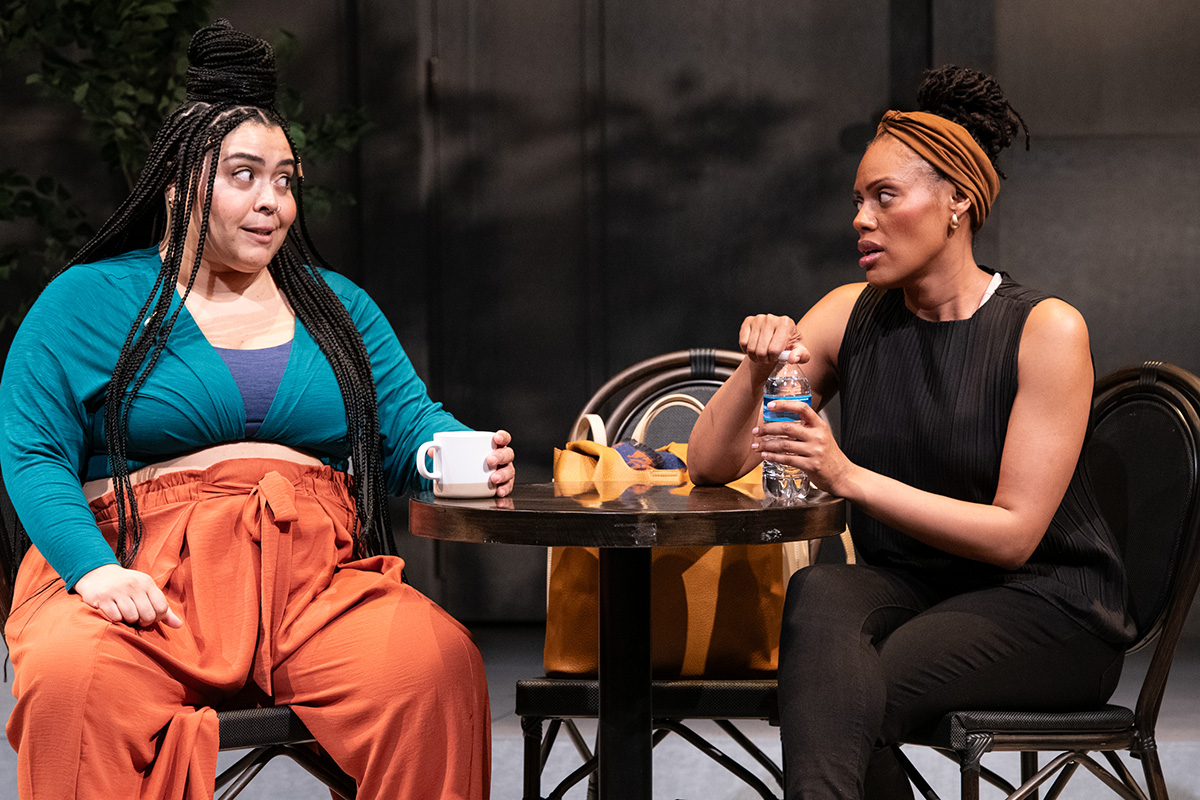
‘A Jumping-Off Point’
Through May 5
Round House Theatre
4545 East-West Highway, Bethesda, Md.
$46-$83
Roundhousetheatre.org
In Inda Craig-Galván’s new play “A Jumping-Off Point,” protagonist Leslie Wallace, a rising Black dramatist, believes strongly in writing about what you know. Clearly, Craig-Galván, a real-life successful Black playwright and television writer, adheres to the same maxim. Whether further details from the play are drawn from her life, is up for speculation.
Absorbing, timely, and often funny, the current Round House Theatre offering explores some serious issues surrounding privilege and who gets to write about what. Nimbly staged and acted by a pitch perfect cast, the play moves swiftly across what feels like familiar territory without being the least bit predictable.
After a tense wait, Leslie (Nikkole Salter) learns she’s been hired to be showrunner and head writer for a new HBO MAX prestige series. What ought to be a heady time for the ambitious young woman quickly goes sour when a white man bearing accusations shows up at her door.
The uninvited visitor is Andrew (Danny Gavigan), a fellow student from Leslie’s graduate playwriting program. The pair were never friends. In fact, he pressed all of her buttons without even trying. She views him as a lazy, advantaged guy destined to fail up, and finds his choosing to dramatize the African American Mississippi Delta experience especially annoying.
Since grad school, Leslie has had a play successfully produced in New York and now she’s on the cusp of making it big in Los Angeles while Andrew is bagging groceries at Ralph’s. (In fact, we’ll discover that he’s a held a series of wide-ranging temporary jobs, picking up a lot of information from each, a habit that will serve him later on, but I digress.)
Their conversation is awkward as Andrew’s demeanor shifts back and forth from stiltedly polite to borderline threatening. Eventually, he makes his point: Andrew claims that Leslie’s current success is entirely built on her having plagiarized his script.
This increasingly uncomfortable set-to is interrupted by Leslie’s wisecracking best friend and roommate Miriam who has a knack for making things worse before making them better. Deliciously played by Cristina Pitter (whose program bio describes them as “a queer multi-spirit Afro-indigenous artist, abolitionist, and alchemist”), Miriam is the perfect third character in Craig-Galván’s deftly balanced three-hander.
Cast members’ performances are layered. Salter’s Leslie is all charm, practicality, and controlled ambition, and Gavigan’s Andrew is an organic amalgam of vulnerable, goofy, and menacing. He’s terrific.
The 90-minute dramedy isn’t without some improbable narrative turns, but fortunately they lead to some interesting places where provoking questions are representation, entitlement, what constitutes plagiarism, etc. It’s all discussion-worthy topics, here pleasingly tempered with humor.
New York-based director Jade King Carroll skillfully helms the production. Scenes transition smoothly in large part due to a top-notch design team. Scenic designer Meghan Raham’s revolving set seamlessly goes from Leslie’s attractive apartment to smart cafes to an HBO writers’ room with the requisite long table and essential white board. Adding to the graceful storytelling are sound and lighting design by Michael Keck and Amith Chandrashaker, respectively.
The passage of time and circumstances are perceptively reflected in costume designer Moyenda Kulemeka’s sartorial choices: heels rise higher, baseball caps are doffed and jackets donned.
“A Jumping-Off Point” is the centerpiece of the third National Capital New Play Festival, an annual event celebrating new work by some of the country’s leading playwrights and newer voices.
Nightlife
Ed Bailey brings Secret Garden to Project GLOW festival
An LGBTQ-inclusive dance space at RFK this weekend

When does a garden GLOW? When it’s run by famed local gay DJ Ed Bailey.
This weekend, music festival Project GLOW at RFK Festival Grounds will feature Bailey’s brainchild the Secret Garden, a unique space just for the LGBTQ community that he launched in 2023.
While Project GLOW, running April 27-28, is a stage for massive electronic DJ sets in a large outdoor space, Secret Garden is more intimate, though no less adrenaline-forward. He’s bringing the nightclub to the festival. The garden is a dance area that complements the larger stages, but also stands on its own as a draw for festival-goers. Its focus is on DJs that have a presence and following in the LGBTQ audience world.
“The Secret Garden is a showcase for what LGBTQ nightlife, and nightclubs in general, are all about,” he says. “True club DJs playing club music for people that want to dance in a fun environment that is high energy and low stress. It’s the cool party inside the bigger party.”
Project GLOW launched in 2022. Bailey connected with the operators after the first event, and they discussed Bailey curating his own space for 2023. “They were very clear that they wanted me to lean into the vibrant LGBTQ nightlife of D.C. and allow that community to be very visibly a part of this area.”
Last year, club icon Kevin Aviance headlined the Secret Garden. The GLOW festival organizers loved the its energy from last year, and so asked Bailey to bring it back again, with an entire year to plan.
This year, Bailey says, he is “bringing in more D.C. nightlife legends.” Among those are DJ Sedrick, “a DJ and entertainer legend. He was a pivotal part of Tracks nightclub and is such a dynamic force of entertainment,” says Bailey. “I am excited for a whole new audience to be able to experience his very special brand of DJing!”
Also, this year brings in Illustrious Blacks, a worldwide DJ duo with roots in D.C.; and “house music legends” DJs Derrick Carter and DJ Spen.
Bailey is focusing on D.C.’s local talent, with a lineup including Diyanna Monet, Strikestone!, Dvonne, Baronhawk Poitier, THABLACKGOD, Get Face, Franxx, Baby Weight, and Flower Factory DJs KS, Joann Fabrixx, and PWRPUFF.
Secret Garden also brings in performers who meld music with dance, theater, and audience interactions for a multi-sensory experience.
Bailey is an owner of Trade and Number Nine, and was previously an owner of Town Danceboutique. Over the last 35 years, Bailey owned and operated more than 10 bars and clubs in D.C. He has an impressive resume, too. Since starting in 1987, he’s DJ’d across the world for parties and nightclubs large and intimate. He says that he opened “in concert for Kylie Minogue, DJed with Junior Vasquez, played giant 10,000-person events, and small underground parties.” He’s also held residencies at clubs in Atlanta, Miami, and here in D.C. at Tracks, Nation, and Town.
With Secret Garden, Bailey and GLOW aim to bring queer performers into the space not just for LGBTQ audiences, but for the entire music community to meet, learn about, and enjoy. While they might enjoy fandom among queer nightlife, this Garden is a platform for them to meet the entirety of GLOW festival goers.
Weekend-long Project GLOW brings in headliners and artists from EDM and electronic music, with big names like ILLENIUM, Zedd, and Rezz. In all, more than 50 artists will take the three stages at the third edition of Project GLOW, presented by Insomniac (Electric Daisy Carnival) and Club Glow (Echostage, Soundcheck).
-

 District of Columbia4 days ago
District of Columbia4 days agoCatching up with the asexuals and aromantics of D.C.
-

 South America4 days ago
South America4 days agoArgentina government dismisses transgender public sector employees
-

 Maine5 days ago
Maine5 days agoMaine governor signs transgender, abortion sanctuary bill into law
-

 Mexico3 days ago
Mexico3 days agoMexican Senate approves bill to ban conversion therapy











